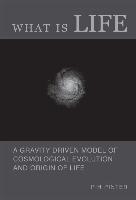What is life? What are we? What, if any, is our significance or role in the universe? - questions which mankind has been pondering for millenia. Thinkers have suggested answers ranging from the philosophically vague to very specific proposals based on recent fashionable discoveries such as deep sea vents or fossil seas on Mars. Is there now sufficient scientific data available in all domains to construct a fully coherent, verifiable schema? This monograph is based on the conclusion that current information is indeed sufficiently complete to allow deduction of a general framework, a working hypothesis of the cosmological evolutionary process and the place of intelligent life within it. It springs from the observation that, in an ever expanding universe, the point will eventually be reached where energy/matter will become extremely dilute. Organisms critically dependent on a sufficient concentration of energy/matter will be obliged to mimic gravitational attraction in order to maintain adequate supplies. This suggests the possibility that we may actually be, in a real physical sense, extensions or creations of the gravitational force - robots compelled to control expansion of spacetime through a directed ability to analyze and manipulate the cosmos, at least locally.
|




